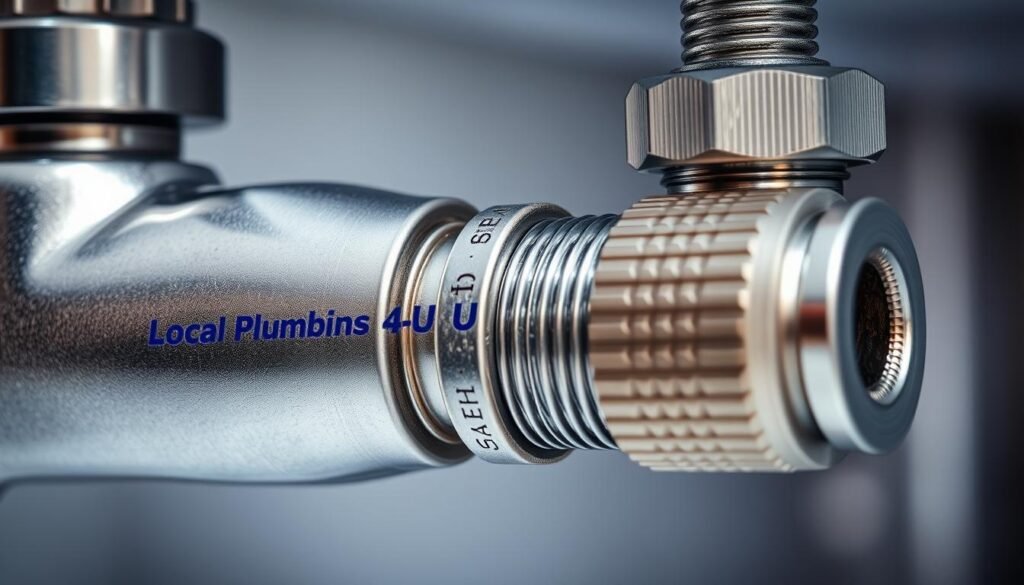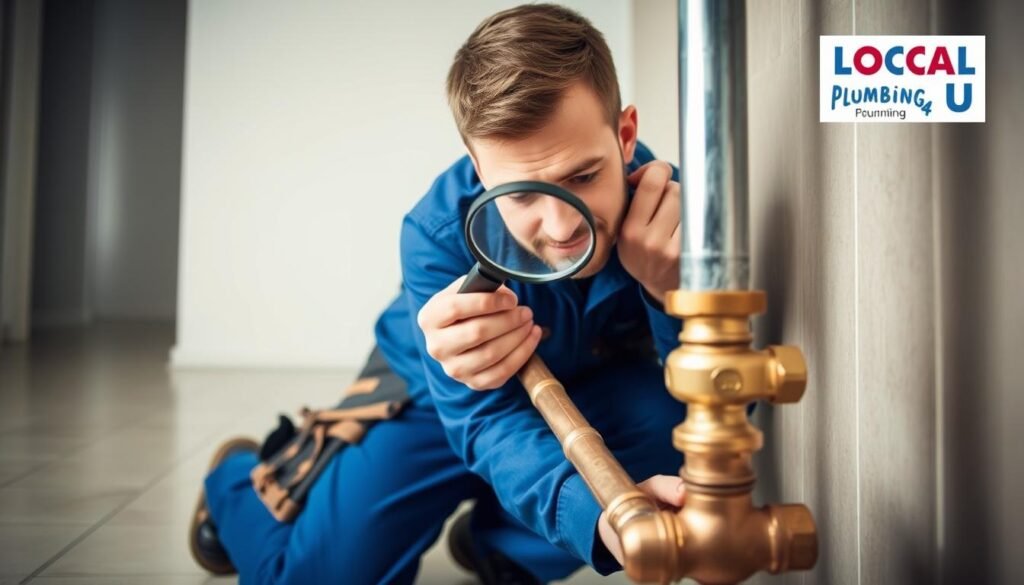Did you know a single leak can waste up to 90 gallons a day? That’s over 32,000 gallons a year. It’s enough to fill a small pool! These leaks can raise your bills and damage your home, costing around $10,000.
Your home’s appliances need reliable water connections to work right. From your fridge’s ice maker to your washer, they depend on good supply lines. Without care, these lines can become weak spots in your plumbing.
At Local Plumbers 4 U, we’ve seen many emergencies in Corona, Riverside County, and the Inland Empire. Simple checks can prevent these problems. Just a few minutes can save you thousands.
Your home’s plumbing system relies on these key paths. A failure in the main line can stop your shower and dishwasher at once. Our team at Local Plumbers 4 U has created this guide to help you keep your home safe and your appliances running well.
Key Takeaways
- Regular inspection of appliance water connections can prevent costly leaks and water damage
- Most water line failures occur at connection points and can be identified during routine checks
- Replacing supply lines every 5-7 years significantly reduces failure risk
- Different appliances require specific maintenance approaches for optimal performance
- Professional inspection once yearly complements your monthly visual checks
- Using stainless steel braided hoses instead of rubber can extend connection lifespan
Importance of Appliance Water Line Care
Water lines are key to your home appliances working right. They need regular care to avoid big problems and keep things running smoothly. This is true for homes in Riverside County and businesses in San Bernardino.
These lines quietly bring water to your fridge, dishwasher, and washing machine. If they fail, you could face small annoyances or big disasters.
Understanding Water Lines in Appliances
Water lines connect your appliances to your home’s water supply. They are vital for daily use. Each appliance needs a specific type of line based on its water needs and pressure.
Refrigerators use 1/4-inch lines for water to ice makers and dispensers. These lines handle lower pressure but need steady water flow.
Washing machines need 3/4-inch lines for more water and pressure. These lines face a lot of pressure changes, making them wear out faster.

Dishwashers use 3/8-inch lines that handle pressure and heat changes. Hot water and detergents can damage these lines if not maintained well.
It’s also important to know the materials used in these connections. Modern appliances often use:
- Braided stainless steel lines (most durable but more expensive)
- PEX tubing (flexible, resistant to freezing)
- Copper tubing (reliable but requires proper installation)
- Plastic lines (economical but more prone to damage)
Common Issues Faced by Homeowners
Homeowners in the Inland Empire CA often face water line problems. These can disrupt daily life and cause damage. Knowing these issues helps prevent leaks.
Leaks and ruptures can happen at connection points. Even a small leak can waste a lot of water each month.
Pressure changes are another big challenge. High pressure can wear out lines faster. This is common in areas like San Bernardino and Corona CA.
Mineral buildup from hard water is a big problem in Riverside County. Calcium and lime can block water flow, making appliances work harder and possibly fail.
Tree roots can also get into outdoor water lines. This can affect water pressure and quality for your appliances. Getting professional help is needed to fix this.
Signs Your Water Lines Need Attention
Spotting early signs of trouble can help fix water line issues before they get worse. Regular checks are key for keeping your appliances safe.
Puddles or moisture around appliances are clear signs of a problem. Even small drips or dampness near connections need checking. Don’t ignore them, as they can get worse.
Lower water pressure in your home might mean a problem with your main water line. If your shower pressure drops while the washing machine fills, or if your fridge’s water dispenser slows down, your lines might need fixing.
Unusual sounds like banging, whistling, or gurgling from your plumbing system often signal air in the lines or pressure irregularities. These sounds usually get louder when appliances draw water and shouldn’t be ignored.
Discolored water from your fridge’s dispenser or ice maker might mean corrosion in your water lines. If you see rust-colored water or sediment, it’s time to inspect your refrigerator water line for possible issues.
Unexplained increases in your water bill often point to hidden leaks. Keep an eye on your usage patterns and check any big changes, as they could mean a water line problem that’s not yet visible.
For commercial property owners in the Inland Empire, these signs are even more urgent. A water line failure can stop business operations and cause damage to inventory and equipment.
Steps for Proper Maintenance of Water Lines
Keeping your water lines in good shape involves regular checks, cleanings, and timely replacements. This approach helps avoid leaks, water damage, and expensive repairs. Let’s look at the key steps to keep your appliance water lines running smoothly.
Regular Inspection Practices
Start by setting up a routine to check your water lines. Do this every three months to spot any wear or damage.
When you check the water lines of your fridge, look for cracks, kinks, or color changes in the tubing. For washing machines, check the hoses for bulges, fraying, or brittleness, focusing on the stress-prone areas.

Also, watch for moisture or water stains around connections and on the floor. Even a small leak can grow over time. Be extra careful around bends and connections, as these are common weak spots.
Here’s a simple checklist for your inspections:
- Check for visible cracks, bulges, or wear on all hoses
- Look for moisture, water stains, or corrosion around connections
- Ensure hoses aren’t pinched against walls or by the appliance
- Verify that connection points are tight but not overtightened
- Test water pressure and flow for any irregularities
Cleaning the Water Lines
Cleaning your water lines regularly stops mineral buildup, mold, and contamination. This is very important for fridges with water dispensers and ice makers, as water quality affects what you drink.
To clean your fridge’s water line, follow these steps:
- Turn off the water supply to the refrigerator
- Disconnect the water line from the back of the appliance
- Prepare a solution of equal parts white vinegar and water
- Connect a funnel to the water line and pour the solution through
- Let the solution sit for 10-15 minutes to dissolve mineral deposits
- Flush thoroughly with clean water before reconnecting
For dishwashers, cleaning the inlet valve and hose connections prevents clogs and ensures water flows right. Remove any visible debris and clean connections with a vinegar solution to remove mineral buildup.
Remember, proper pipe maintenance is not just about appliance connections. It’s about your whole plumbing system. Ignoring other parts can lead to problems too.
Replacing Old or Damaged Lines
Even with good care, water lines and hoses have a limited life. Knowing when and how to replace them is key to avoiding big failures.
Experts say to replace washing machine hoses every 3-5 years, even if they look fine. Rubber hoses are more likely to fail and should be swapped for stainless steel-braided hoses for better durability and safety.
When replacing appliance hoses, always follow these guidelines:
- Turn off the water supply completely before starting
- Place towels under connection points to catch residual water
- Use appropriate tools to avoid damaging fittings
- Apply thread tape to ensure watertight connections
- Hand-tighten connections first, then use a wrench for a quarter-turn more
For dishwasher hose care, check both the inlet and drain hoses. The drain hose often gets overlooked but can crack or clog, leading to leaks or poor drainage. Make sure the new hose fits your model’s specifications.
Water supply line repairs might need special tools or skills, like for copper or PEX lines. If unsure, getting a professional can prevent more damage.
The average cost of water damage repair from a burst washing machine hose exceeds $5,000, while preventative replacement costs less than $30.
By following these maintenance steps, you’ll greatly reduce the risk of water damage and extend your appliances’ life. Remember, consistency is key. Regular maintenance is the only way to keep your appliances running smoothly.
FAQs About Appliance Water Line Care
Many property owners have questions about appliance water line care. Knowing the basics of water line maintenance can save you time and money. It also helps prevent water damage. Below, we answer the most common questions from customers in Corona and nearby areas.
How often should I inspect my appliance water lines?
Homeowners should check visible water lines every three months. Look for signs of wear or leakage on connections to refrigerators, washing machines, dishwashers, and water heaters.
Business owners should inspect more often, ideally monthly. Restaurants, laundromats, and other businesses with high water use should check weekly.
Annual professional inspections are key, regardless of property type. These inspections often use camera equipment to spot problems early, preventing bigger issues.
What tools do I need for maintenance?
You’ll need some basic tools for water line maintenance:
- Adjustable wrench for tightening connections
- Pipe cleaning brushes for removing mineral buildup
- White vinegar or specialized cleaning solution
- Flashlight for inspecting dark areas
- Towels or rags for cleanup
For refrigerator water lines, you might need a cleaning kit. These kits have brushes for the narrow tubing. They help remove mineral deposits that can slow water flow and ice production.
When should I call a professional?
While you can handle some maintenance, there are times to call a pro. If you have persistent leaks, mineral buildup, discolored water, unusual noises, or water pressure issues, seek help.
Also, call a pro for refrigerator water line installation or replacement. Improper installation can cause leaks and damage. Professionals ensure connections are secure and meet local codes.
For businesses, having a reliable plumbing service is wise. They can provide emergency help and scheduled maintenance. This helps avoid interruptions and costly damage that can harm your business and customers.
Local Plumbers 4 U Services for Water Line Maintenance
Keeping your water lines in good shape is important. DIY checks are helpful, but a pro can make sure your appliances last longer. Local Plumbers 4 U offers top-notch water line care across the Inland Empire.
Overview of Services Offered
Our team does thorough checks on all your home’s water lines. We spot problems early to save you money. Our services include:
• Professional water supply line repair
• Preventive maintenance programs
• Emergency leak detection
• Appliance connection installation
• Water pressure regulation
Why Choose Local Plumbers 4 U
We’re the go-to plumbers in Corona and nearby. Our experts are certified for all major brands. Regular checks with us keep your plumbing running smoothly and avoid future headaches.
We’re known for clear prices, quick service, and lasting fixes for homes and businesses.
Contact Information and Support
Want to keep your water lines safe? Call us at 909-378-9322 to book a check-up. We serve Corona, Riverside County, and San Bernardino.
For more on our services or to book online, visit our website. Our team is ready to help with any water line maintenance questions.
